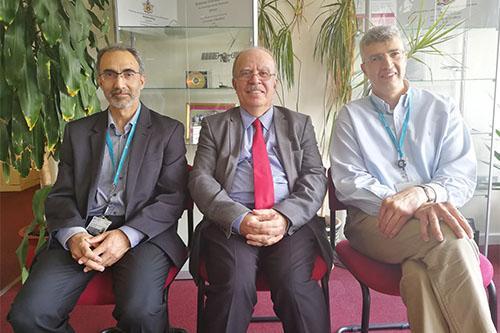Scanning Device for Passenger Verification
Bradford’s cutting-edge research in wireless communications, AI, cybersecurity, visual computing and Biometrics played a key role in securing €1.1m from the EU H2020 Marie Skłodowska-Curie Actions. Bradford will play major role in developing the new AI and cybersecurity technologies and operational parameters of land/sea border security systems to improve the verification accuracy, security level, coverage area and signalling.
The project entitled “Secure and Wireless Multimodal Biometric Scanning Device for Passenger Verification Targeting Land and Sea Border Control” has a UoB research team consisting of Professor Raed A Abd-Alhameed (PI), Professor Rami Qahwaji and Professor Irfan Awan.

Biometric identification has emerged as a very efficient technology for the verification of the identity of passengers in border crossings. The application of Biometric technologies is rather straightforward in airports or rail terminals, where capturing conditions are strictly controlled and biometric traits can be captured and extracted using fixed equipment that has been calibrated for the given application location.
It is acknowledged that other border crossing scenarios pose more stringent design requirements on the devices since the capturing of data takes place in uncontrolled environments, including when passengers are crossing the land borders control points inside their vehicle or on board for sea travelling. This provides the motivation for this exciting new research to develop a mobile identification platform that enables border checks with on-board passengers.
In this demanding outdoor environment, the passenger’s identification solution to be adopted will have different constraints and requirements compared to traditional automatic border controls. In this context, eBORDER aims to design, implement and validate advanced biometric verification algorithms targeting face and fingerprints biometric traits that can overcome environmental and quality-based parameters.
The University of Bradford team will explore the novel biometric identification in collaboration with the commercial partners: ACTICOM GmbH (Germany) and TELESTO Technologies (Greece), and European institutions: Instituto de Telecomunicações (Portugal) and University of Patras (Greece). The team will also lead on the development of new testbed, optimization and validation mechanisms, in collaboration with Exploit AC (Germany).
